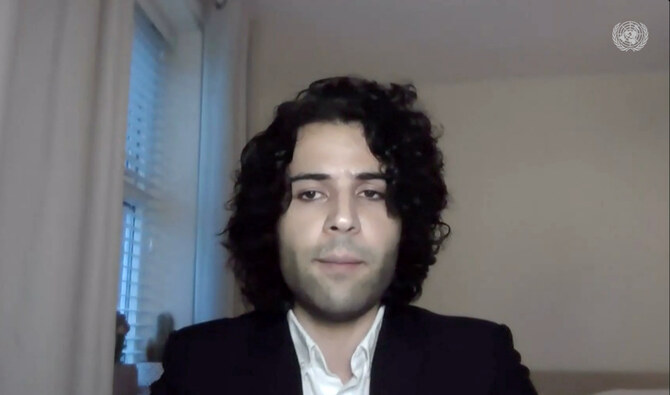NEW YORK CITY: A leading Libyan human rights activist called on the UN Security Council to prioritize accountability for human rights violations in the country over the planning of elections.
Addressing council members on Monday, Ali Omar, the director of Libya Crimes Watch, warned that any future political process would be undermined by the absence of justice for the victims of torture, arbitrary detention and other crimes.
He presented an alarming report that documented more than 280 “grave” violations of human rights in Libya this year, “perpetrated by both eastern and western authorities” in the country.
He said: “These figures are not mere statistics but reflect harrowing stories and real tragedies of victims, including the most vulnerable groups such as women and migrants, as well as activists, journalists, lawyers and others.
“These violations include torture in prisons, arbitrary arrests, enforced disappearances and extrajudicial killings. Such practices not only destroy the lives of individuals and their families but also sow fear throughout society and undermine any hope for peace.
“These heinous crimes are not isolated acts, but systematic and recurrent, carried out and overseen by all sides in the conflict, including the Libyan Armed Forces, the Government of National Unity, and other military groups.”
Omar, who lives in exile, urged the Security Council to shift its focus from planning an electoral process for Libya to the urgent need to hold accountable those responsible for rights abuses in the country.
“The persistence of these violations poses a serious threat to social peace and stability in Libya,” he said.
“How can a country where individuals accused of war crimes and crimes against humanity hold the senior positions of power, how can such a country organize fair and transparent elections?”
Omar, himself a former prisoner of conscience, added: “Prisons and unofficial detention centers represent a dangerous and ongoing phenomenon. In these places, human dignity is stripped away and individuals are treated as mere numbers without value.”
He highlighted as particular concerns the ongoing repression of civil society, the arbitrary detention of activists, and the deaths of prisoners in suspicious circumstances. He told how three detainees — a woman and two followers of Sufi orders, a religious minority long subjected to persecution — died under torture at an unofficial detention center in Benghazi in November 2023.
“This culture of impunity perpetuates violence and political instability,” Omar said.
He also spoke about the chilling effects of repressive government legislation, including anti-cybercrime and anti-terrorism laws that were used to justify the arrests of more than 50 activists in eastern and western Libya in 2023 alone.
Omar highlighted the cases of 16 people, including four children, who were arrested for demonstrating peacefully in support of the former Libyan regime following the catastrophic collapse of two dams in Derna in September 2023 following a storm. The disaster claimed at least 6,000 lives. Demonstrators were arrested for protesting against the corruption and governmental negligence they believe contributed to the disaster, and demanding that those responsible be held accountable.
Calling for urgent reforms in Libya, Omar urged the Security Council to establish an independent international mechanism to investigate violations of human rights and hold the perpetrators accountable.
He also called for the UN Support Mission in Libya to be granted a stronger mandate to address issues related to human rights, including the protection of vulnerable communities and an end to arbitrary detentions.
“Libyan civil society and human rights defenders in exile are asking for one thing: accountability,” Omar said. “Without it, no political process, no election, will be credible.”
Libya continues to grapple with deep political divisions and ongoing violence, despite years of international efforts to mediate peace and facilitate democratic elections.
The nation has been in turmoil since the Arab Spring protests in 2011 that led to the overthrow and killing of Muammar Qaddafi, who had ruled for 42 years. It is split between two rival governments backed by armed militias and international patrons. In the west of the country, Prime Minister Abdul Hamid Dbeibah heads the internationally recognized Government of National Unity. In the east, Prime Minister Ossama Hamad heads the Government of National Stability, backed by military commander Khalifa Haftar’s Libyan National Army.
Given this fractured governmental structure and competing military factions, many fear the continuing failure to address human rights violations can only prolong the instability and prevent the formation of a legitimate, unified government.
Omar urged council members to “look into the eyes of the victims” and take decisive action to prevent further atrocities.
































